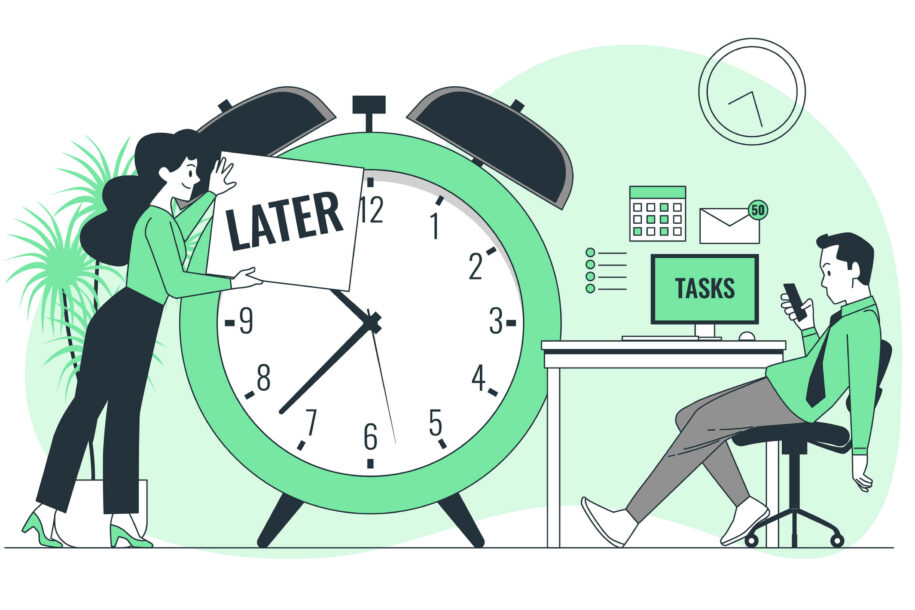Procrastination is a complex, psychological, self-defeating behavior, marked by short-term benefits and long-term costs. It’s the behavior of replacing more urgent actions with less urgent tasks, or putting off impending tasks to a later time, or wanting to avoid the unavoidable things and it affects everyone to some degree. Some people may encounter it as a minor problem, whereas others can experience it as a source of stress and anxiety.
Overall procrastination is becoming a growing problem, especially for working people that have tight schedules causing them to miss deadlines, opportunities and achievements. According to a 2016 study on procrastination and coping, 20-25% of adults worldwide are chronic procrastinators!
Why do people procrastinate?
Procrastination stems from inner feelings, perfectionism, fear of failure and lack of motivation.
Many people lack confidence and this is associated with fear of failure, so they keep pushing back the initiation of a task.
Procrastinators are often perfectionists, for whom it may be psychologically more acceptable to never tackle a task than to face the possibility of not doing it well.
We naturally tend to avoid difficult things in comparison to those which seem easy to us. Additionally, people will lose their interest and motivation when the return is far away.
Procrastination is also driven by a variety of thoughts and habits but fundamentally, we avoid/put off tasks because we do not believe we’ll enjoy doing them, and want to avoid making ourselves unhappy. It’s a ‘gain vs pain’ matter.
Finally, people may procrastinate when they are overly distracted, bored, fatigued or anxious.
Is procrastination a mental health issue?
It’s important to highlight that although procrastination is not considered a mental health condition per se, it is connected to mental health challenges. Several studies have linked procrastination to depression, anxiety, and low self-esteem. According to the American Psychological Association, procrastination can also play a role in attention-deficit/hyperactivity disorder (ADHD), obsessive compulsive disorder (OCD), and several other conditions.
What are the potential consequences of procrastination?
- Lower performance.
- Low quality work.
- Reduced well-being (anxiety, stress, poor diet options, insomnia or immune system and gastrointestinal disturbance).
- Poor impulse control.
- Negative impacts in personal and professional relationships.
How do we beat procrastination?
Procrastination is a behavior that can be managed and overcome; with the right knowledge, tools, and support.
- Set a clear and feasible goal
Goal-setting and clear focus are key in order to start. Try not to overthink it, just begin to work on it. Once you begin, the next steps often flow naturally.
- Break the task down into smaller chunks
If you feel overwhelmed about a goal/task, inevitably you will procrastinate. If it feels like “too much,” make a plan and break the action points into smaller, more digestible parts. Your brain will register that the tasks are small enough to be handled.
- Practise your organizational skills
Listing your tasks, prioritizing them, scheduling deadlines and limiting distractions can be a very useful start.
- Increase Your Motivation
Don’t let your emotions and negative thoughts get in the way of accomplishing what you need to do. We tend to avoid tasks that we’ve identified as lacking value. You could introduce positive thoughts and perhaps a rewarding system that can motivate you every time you complete a task.
- Try mindfulness practices
People who are mindful, procrastinate less, and people who don’t have any remedy tend to procrastinate more and be more self-critical. Mindfulness helps you be in the present moment, observe without judgment your thoughts and re-unite with your center.
- Show some self-compassion
If you tend to procrastinate, don’t be hard on yourself. Think that although your present self benefits by avoiding unpleasant work, your future self will pay the price in stress or punishment. Developing self-empathy then, can be an important first step to ending the habit.
Changing a habitual behavior consumes a lot of energy, but you don’t have to go through this phase alone. You can ask the assistance of a professional, such as a Coach or if you have identified that your procrastination is associated with mental conditions, as the ones mentioned above, you can reach a therapist to support you.
Image by Freepik

